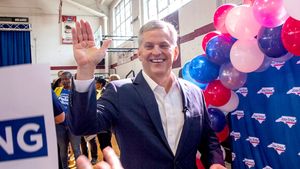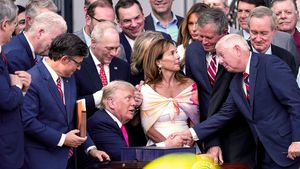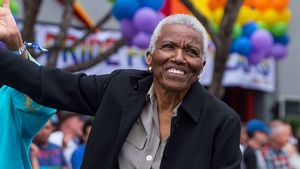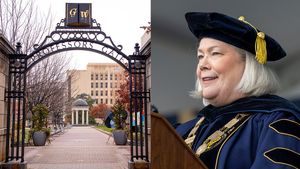My friend and his boyfriend had just moved in together and were hosting their first Oscars party. The annual ceremony is always an occasion for lively shade, but this year was different. Instead of being surrounded by my old stalwart group of gays, there were some new faces to go with this new apartment. When Timothee Chalamet, the young breakout star from Call Me by Your Name who was up for Best Actor, walked the red carpet in his immaculate white tux, I heard a phlegm of disgust. "Ugh, I hated that movie!" It was something I had expected to hear at some point in the night because the gays are not a monolith, wine was flowing freely, and over the months leading up to the Oscars Call Me by Your Name had been subjected to a number of criticisms from within the queer community. A fervent fan of the movie, I had found most of those criticisms unfair, so in a hushed and chardonnayed stage whisper, I leaned over to a familiar face sitting next to me and said, "The gays can't like anything."
Related | Ryan Murphy's Boys in the Band Revival Has Found Its Cowboy
Though half-kidding, I was referring to a tradition among queer audiences to find fault with any work bearing queer representation. With a history of unsavory and even damaging portrayals of LGBTQ people in the media, the apprehension is understandable, but we're living in a time of such richly diverse storytelling that this continued nitpicking feels more like an involuntary reflex than a reasonable response.
Practically since its inception, The Boys in the Band has inspired a wide range of reactions among gay men, from empathy to derision. "I was horrified by the depiction of the life that might befall me," one theatergoer recalled of the 1969 London premiere of the play. "I have a lot of strong feelings about that play. It's done a lot of harm to a lot of gay people."
Often considered a landmark, Mart Crowley's 1968 off-Broadway show features eight openly gay male characters living precariously well-adjusted lives in a New York not yet affected by the Stonewall Riots. Both the play and William Friedkin's 1970 film adaptation are products of their time, bookending a moment of transition and revolution that forever altered the way queer people saw themselves and were seen by the larger culture.
Fifty years later, the boys are back in town with a revival produced by Ryan Murphy and featuring something the original production could never have imagined: an entire cast of openly gay actors. But for a play that was seemingly rendered a relic a year after its premiere, what does The Boys in the Band have to say to queer audiences today? And do they even want to hear it?
Related | Watch: Director William Friedkin Discuss Boys in the Band
Art, at its best, holds up a mirror to society, and Crowley wrote honestly of his own reflection: an at-times grotesque picture of bitchy, self-loathing queens armed with a never-ending supply of martinis and acerbic one-liners they deploy in a transparent attempt to disguise their very real pain.
"I knew a lot of people like those people," Crowley says of his characters in Vito Russo's essential 1995 documentary The Celluloid Closet. "The self-deprecating humor was born out of a low self-esteem from a sense of what the times told you about yourself."
Crowley rendered his experience as a gay man of the 1960s -- when homosexuality was still considered a mental disorder, when dimly lit bars were raided by a vindictive and hostile police force, when books with gay themes were banned and burned, when queer characters were routinely killed off or killed themselves in their infrequent (if coded) appearances onscreen. The self-loathing f****t was the original and only mold, and who was Mart Crowley to break it? "Show me a happy homosexual," Michael, the protagonist partially based on Crowley, says, "and I'll show you a gay corpse."
The Advocate ran a review of The Boys in the Band four months after its off-Broadway debut, arguing that it reinforced, for straight audiences and critics, the idea that "our world is all misery just because we have one trait that they regard as a problem or, worse yet, an evil: homosexuality." The Gay Liberation Front even staged a protest at the film's Los Angeles premiere -- the first time, according to Russo, "that gay people protested a Hollywood movie" -- something they would do again for Friedkin's Cruising nearly a decade later.
Related | Peppermint is the Gender-Fluid Oracle Shattering Broadway's Barriers
For many marginalized communities, representation is something of a double-edged sword. While we crave to see ourselves in the media we consume and inspire, we are also wary of being reduced to stereotypes -- a fear too often realized when the person telling the story is an outsider. That, however, does not make "insider art" above reproach. Just ask Tyler Perry. Minority communities can be very hesitant to criticize something created by one of their own, as we possess a general desire for that person or project to succeed and hope that success translates into more opportunities for others within the community.
As an African-American, seeing Black Panther felt more like one's duty than a choice. There were field trips, crowdfunding campaigns, and celebrity-sponsored screenings all to ensure that this movie got a tremendous backing from black people because if it wasn't a success, as history has taught us, this could be the last time it would happen. This type of effusive support is rare, and it requires something truly extraordinary like Black Panther to achieve it. So then what happened with Call Me By Your Name?
Universally praised when it debuted at Sundance, Luca Guadagnino's exceptional adaptation of the Andre Acimen novel quickly emerged as an Oscar frontrunner and appeared on nearly every critic's year-end list; but it seems as it racked up more and more accolades, more and more queer people wanted to knock it down a peg. "Why Do Gays Keep Falling for Call Me by Your Name?" posed the headline by Slate writer and RuPaul's Drag Race season 10 contestant Miz Cracker, who goes on to question the authenticity of the film, the book, and the author. While some left the movie deeply affected by seeing a gay love story that didn't end tragically, and appreciated it as an affirmative tale of young same-sex desire, others voiced a spiteful contrarianism: a sort of "I didn't like this, you shouldn't either, and you're an idiot if you do."
It's frustrating. But it's also an important part of being queer, this questioning of the status quo. Small, indie movies, once the only vehicle for queer narratives, come with a built-in sense of legitimacy, no matter the quality of the product, because they're made against the grain. Meanwhile, queer fare out of Hollywood, saddled with a century of unflattering receipts, is almost always greeted skeptically. Even Moonlight, on its long march to the Best Picture Oscar, had its share of detractors who worried that the movie wasn't "gay" enough. Now we have Love, Simon, Greg Berlanti's answer to John Hughes's '80s classics, and the first gay teen rom-com to be distributed by a major studio. While praising the mere existence of the film, queer critic Peter Knegt seems to find fault with the Hollywood-ness of it all, wondering, "Maybe we were better off just having to seek out indie alternatives with narratives where the LGBTQ experience, in all its many forms, was portrayed with the kind of messiness we will all absolutely face in our day-to-day lives."
Related | Michael Grandage & Christopher Oram On Bringing Frozen to Broadway
It's not an unfair quibble, but perhaps one lacking nuance. According to Knegt, this film feels like it belongs to the year 2000, citing today's "plethora of legitimately outstanding LGBTQ storytelling happening in independent film and on TV," which, he argues, makes the movie a lot less necessary now than it would have been at the turn of the millennium. That year, we had Berlanti's first attempt at the gay rom-com, The Broken Hearts Club, which was basically The Boys in the Band on a baseball diamond in West Hollywood -- except Berlanti's characters were less aggressively maudlin, having learned a thing or two in the intervening 30 years. Like Queer as Folk, its contemporaneous cousin, The Broken Hearts Club inhabited a world that was mostly white, mostly straight-acting, and mostly middle-to-upper-middle class.
As a 15-year-old black queer boy growing up in Poughkeepsie, N.Y., that world was foreign to me, but I still latched onto The Broken Hearts Club because it was gay and I needed something gay in my life -- to show me that it was OK, that love was possible, and that I wasn't alone. When Moonlight came out, those feelings were not only articulated but amplified tenfold by a story that spoke to me on my own terms. Though Moonlight and The Broken Hearts Club are in two different leagues, both are important to me -- one made room for the other, and I would loathe to have someone eviscerate either because they didn't share my response to them.
 Maybe The Boys in the Band did do "a lot of harm to a lot of gay people," but for others it surely carries a different meaning. After all, this isn't the first revival of the play and it probably won't be the last. A 1996 New York Times article about a production in the Manhattan neighborhood of Chelsea attributed renewed interest in the play to the fact that there were "so many comedies and dramas about gay life now that no single work is expected to be representative or to serve as a paradigm."
Maybe The Boys in the Band did do "a lot of harm to a lot of gay people," but for others it surely carries a different meaning. After all, this isn't the first revival of the play and it probably won't be the last. A 1996 New York Times article about a production in the Manhattan neighborhood of Chelsea attributed renewed interest in the play to the fact that there were "so many comedies and dramas about gay life now that no single work is expected to be representative or to serve as a paradigm."
Looking back, 1996 won't strike many as overflowing with dynamic queer representation, especially in comparison to 2018. Yet for the myriad perspectives and creative voices present today, once a piece of art reaches a certain level of recognition or achievement it automatically becomes archetypal. It may be unfair to publicly lacerate a little indie movie -- and who cares if you do -- but it's open season on a more commercial venture.
Aside from the mere joy of pot-stirring, perhaps this tendency to trash is more of a reaction to appropriation. If Call Me By Your Name had never taken off the way it did, would it have remained something of a gay secret, like the countless indie alternatives held close to individual hearts like precious and rare stones? Perhaps once a secret is out, it inevitably loses its luster, its queer appeal.
Whether a movie is mainstream or independent, the beauty of the times we live in is that we don't have to choose. We can watch a movie about ACT UP in 1990s France (BPM), or an arthouse picture about first love (Call Me By Your Name), or a Chilean film about a trans woman's quest for justice (A Fantastic Woman), or a big, multiracial Hollywood rom-com (Love, Simon). The Boys in the Band opened the door for queer representation on our own terms, and each generation -- each new film, TV show, or Broadway play -- hacks away at that door and redefines those terms. Show me a happy homosexual and I'll show you any number of queer characters we can now so easily take for granted.
The Boys in the Band opens May 31 at the Booth Theatre in New York City. Click here for ticket information.










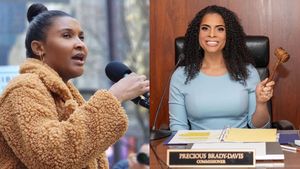









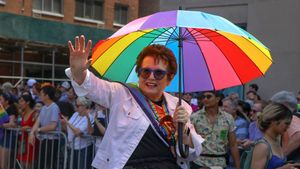













 Maybe The Boys in the Band did do "a lot of harm to a lot of gay people," but for others it surely carries a different meaning. After all, this isn't the first revival of the play and it probably won't be the last. A 1996 New York Times article about a production in the Manhattan neighborhood of Chelsea attributed renewed interest in the play to the fact that there were "so many comedies and dramas about gay life now that no single work is expected to be representative or to serve as a paradigm."
Maybe The Boys in the Band did do "a lot of harm to a lot of gay people," but for others it surely carries a different meaning. After all, this isn't the first revival of the play and it probably won't be the last. A 1996 New York Times article about a production in the Manhattan neighborhood of Chelsea attributed renewed interest in the play to the fact that there were "so many comedies and dramas about gay life now that no single work is expected to be representative or to serve as a paradigm."




